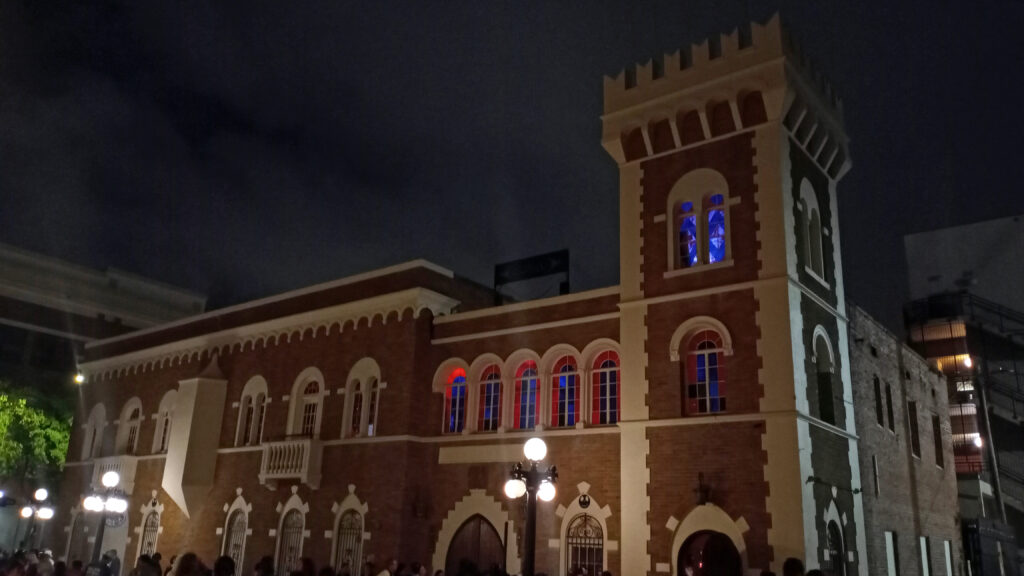The Castle in Ybor City, Tampa, Florida, has a rich history as a cornerstone of the area’s cultural and social scene. Originally built in 1930 as Cristobal Colon castle for the Knights of the Golden Eagle fraternal order. In 1968, it became the Labor Temple (Agrupacion Benefica y Cultural del Centro Obrero), a hub for Ybor City’s cigar and restaurant labor union workers to organize and host union events. In 1992, Tampa native Alan Kahana purchased the building and transformed it into a gothic-style nightclub called The Castle. By the late 20th century, the building transitioned from a labor temple to a vibrant nightclub.
The Castle quickly became known for its distinctive atmosphere, characterized by medieval arched doors, stained-glass windows, and a dungeon-like dance floor. The venue embraced a variety of musical genres over the years, including goth, industrial, and electronic dance music, and became a popular spot for themed nights like Star Wars and vampire balls. It also played a significant role in the goth subculture, described as a “goth paradise” and an internationally renowned goth and industrial musicnightclub. Saturday Night Live’s Goth Talk segments were created after an SNL writer was brought to the Castle by friends.
The Castle’s adaptation and enduring appeal highlight its ability to evolve with changing cultural trends while maintaining a unique identity that contributes to the historic fabric of Ybor City. This venue has been a nightclub and a cultural landmark, reflecting the area’s diverse history and community spirit.
Cristobal Colon Castle: The Early Years 1930-1968
Constructed in 1930, The Castle was originally built as a lodge for the Knights of the Golden Eagle in the Historic District of Ybor City, Tampa, Florida. Known initially as the Cristobal Colon Castle, the building stands at the corner of 16th St and 9th Ave, where it first opened in September of the same year.
The Knights of the Golden Eagle was a fraternal organization founded in Baltimore, Maryland, in 1873. The group was part of a broader pattern of fraternal orders during the late 19th and early 20th centuries, providing members with social connections, mutual aid, and community services. These societies often built lodges or halls, “Castles” that served as community hubs for meetings and social events, reflecting their commitment to fellowship and civic engagement. The order’s original objectives were to help its members find employment and aid them while unemployed.
The Labor Temple: Organized Labor and the Decline of the Cigar Industry 1968-1992
In 1968, The Castle took on a new role as the Labor Temple, purchased for $38,000 by the Cigar Makers Union of Tampa and Local 104 of the AFL-CIO Hotel and Restaurant Employees and Bartenders Union. Officially named the Agrupacion Benefica y Cultural del Centro Obrero, this site became a central hub for cigar and restaurant union workers to organize and conduct union activities. Previously, the union had been headquartered since 1928 in a different venue—a two-story, white-stucco building constructed in 1925 at 1614 8th Ave. This earlier building was sold to Urban Renewal for $48,000 in November 1967 and demolished in 1968, paving the way for the union’s move to The Castle.
By 1987, the decline of the cigar industry in Ybor City had reshaped the local cultural landscape. On Saturday nights, the Agrupacion Benefica y Cultural del Centro Obrero, traditionally a hub for union activities, transformed into a vibrant Afro-Caribbean and reggae music venue. Despite this musical shift, the building continued to support union-related activities throughout the rest of the week.
Birth of The Castle Bar and Nightclub: A Counter Culture Icon 1992-Present
In 1992, the lower floor of The Castle was purchased by Tampa native Alan Kahana and debuted as a saloon during Guavaween, Ybor City’s annual Halloween event held on the last Saturday of October. Interior designer Susan Johnson transformed the space to mimic a medieval castle’s aesthetic. Originally, music was supplied by a jukebox, but the venue has since shifted to featuring DJs. The 1993 Guavaween celebration saw a decrease in earnings, leading the Ybor City Chamber of Commerce to opt out of hosting the 1994 event, with The Castle being one of the few local businesses to offer financial support.
Upon its opening, The Castle operated three nights a week—Thursday through Saturday. The upstairs area, once a spot for union-related celebrations, was remodeled into what is now the Main Hall, the primary dance floor. The ground floor, previously office space for cigar union workers, was turned into “The Dungeon,” a thematic party space with a dark, Gothic decor. The saloon features the unique “moat bar,” where a waterway integrates into the bar’s countertop. Over the 1990s, The Castle hosted a variety of musical evenings, including acid jazz, swing revival, and live band performances. It also became a gathering place for the local goth community, leading to themed nights catering to this subculture.
By 1997, the venue was informally recognized for its Goth Night on Fridays, and by 2003, it also hosted retro 80s and additional goth-themed nights. Currently, The Castle is open on Fridays and Saturdays, regularly organizing events themed around concepts like Star Wars, steampunk, and more, attracting a diverse crowd. Described by the Tampa Bay Times as a premier destination for goth and industrial music globally, The Castle continues to be a significant cultural hotspot in Ybor City.


